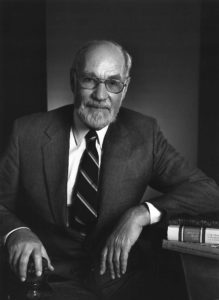In Memoriam: Thad Tate, by Norman Fiering

Photo Credit: ©1988 Yousuf Karsh
- Obituary for Thaddeus W. Tate, Jr.
- A Conversation with Thad Tate, by Fredrika J. Teute
- Travels with Thad, by Warren M. Billings
- Remembering Thad Tate, by Chandos Brown
- In Memoriam: Thad Tate, by Norman Fiering
- Trekking with Thad, by Michael L. Nicholls
- In Memoriam: Thad Tate, by Thad Weaver
In Memoriam: Thad Tate
I first met Thad when I arrived at the Institute as a post-doctoral fellow in the summer of 1969. Thad was the editor of the WMQ, Lester Cappon the director, Steve Kurtz the book editor. When Cappon decided to retire in 1969, his move set off a string of changes in the major positions at the Institute, and a few unsettling years followed. Steve was asked to take over as director, and he recruited Jim Hutson to be the new book editor. Only a couple of years later, in the spring of 1972, Hutson decided to move to the Library of Congress. My fellowship term was drawing to a close, I was looking for work, and Steve offered me the job of book editor, succeeding Hutson. Then surprisingly Steve himself announced his own resignation and went off to Hamilton College.
At that point, Thad was the logical person to assume the directorship following Kurtz, and fortunately for the Institute, the Council eventually saw the wisdom of that choice. But there were some months of uncertainty which Thad naturally did not take well. He was silently offended even by the Council’s momentary hesitation, and there is no question he would have hated it if an entirely new person was called in as director over him.
I was aware that Kurtz appointing me as the book editor just before he departed deprived his successor, whoever it would be, of choosing his own person for that position. It would have been possible to leave the job open for a short period or to name an interim editor. But I was given a permanent appointment, and thus when Thad became director he inherited me as his right hand, like it or not. Thad never gave me even the slightest hint that he would have preferred it otherwise, and I made it clear to him from the start that I supported his leadership wholeheartedly. In the course of working under Thad for eleven years, 1972–1983, my loyalty to him never wavered, nor my appreciation of his fine qualities. Of course, he was such a gentleman, so inherently decent, that whatever his private thoughts might have been about my appointment, I would never know them. Twice he asked me to serve as acting director when he was on leave, once because of a medical problem—a detached retina resulting from a rough game of handball—and another time when he took a sabbatical. I went on to become a full-time administrator after leaving the Institute, and those years served as an apprenticeship for me, with Thad as an exemplary chief.
His two greatest virtues as an administrator were patience and tact. Occasionally he would blow his stack, charging out of his office shouting to the gods about some frustration, usually emanating from decisions by the College or CW, but those were rare moments that quickly subsided. Thad knew that most of the internal problems a boss faces will take care of themselves, if he just leaves them alone without a lot of active top-down interference. This was a kind of respect for the adulthood of those working around him and under him. Thad was polite, kind, sympathetic, gentle, but yet firm enough. He was serious but not dour, reserved in his spoken judgments of people, yet always a sharp-eyed critic, however much was held back. The Institute was a model of collegiality. Once a week, religiously, the professional historians on the staff—Thad, me, Mike McGiffert, and John Selby—including the two fellows in residence, had lunch together. It was not particularly a business lunch and the shop talk was enlivened by the presence every year of a new fellow from yonder territory.
Thad clearly enjoyed a wide variety of people, no matter the eccentricities, and was something of a bon vivant. He liked it when he could share with others his keen enthusiasm for good food and drink. Institute staff traveled to at least two historians conventions every year, and when it came to deciding where to eat, we all deferred to Thad’s fabled knowledge of the best restaurants in a score of cities.
He also liked to cook, and at some point someone on the staff, maybe Joy Dickinson, proposed that we produce an informal Institute cookbook, with everyone contributing recipes. “Cook pamphlet” might be a more accurate description of the modest result, but it was a real product. My copy is long lost, yet I will never forget the first entry, entitled: “The Director Makes a Salad.” This was Thad’s contribution and it began: “Never, ever, use iceberg lettuce.” I have honored Thad ever since by following that counsel as well as much else that I learned from him.
Norman Fiering
The Director Prepares a Salad
From “The Scholarly Chef or, The Whole Institute Cookbook”.
